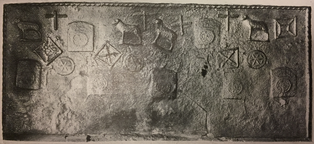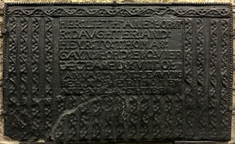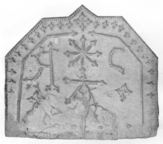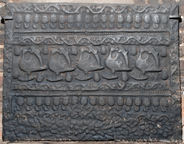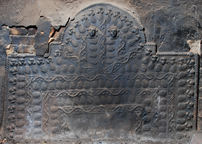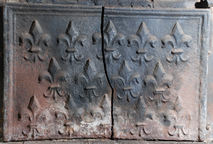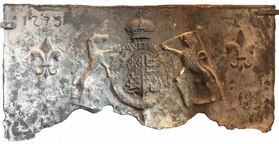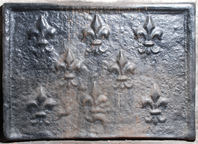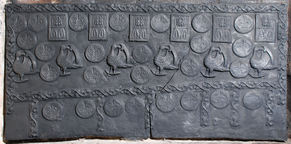-
1194
Description: Rectangular shape; twisted rope or strap edging (top and sides); semi-random arrangement of three stamps interspersed with rope crosses and rope 'squares' with saltires or linked smaller squares within; low centre, a crowned rose-en-soleil stamp repeated, more or less regularly, five times across the width of the fireback; above, four circular butter mould stamps with a hexagonal design, between which are two rope squares with saltires and, to the left, a rope square containing a smaller square with its corners linked to the corners of the outer square; above, a horned sheep standing on a base repeated four times, between which are two crowned rose-en-soleil stamps and four rope crosses, with a square-within-a-square at the right end.
Notes: The rose-en-soleil was the badge of King Edward IV and, thus, a Yorkist symbol. It, together with the butter mould and rope squares, are seen on other firebacks associating them with the same producer/foundry. A ram is the crest of the Gage family of West Firle, for many centuries major landholders in Sussex; it is also the crest of the Clothworkers' Company of London. Until about the 1920s, at Heringdales/Heronsdale Manor, Waldron, East Sussex, which, however, was not a Gage property. Illustration from Christy 1908.
- Decoration tags:
- rectangular (shape)
- rope (edging)
- simple stamps
- carved stamps
- heraldic
- apotropaic
- animals
- objects
Manufactured: in the mid- to late-16th century possibly at Pounsley Furnace, Framfield in the Weald area of England.
Current location: Wickham Manor, Winchelsea, East Sussex, England.
Museum number: NT/WMF/M/007 (part of the National Trust museum group)
Citation: Gardner, J. S., 1898, 'Iron Casting in the Weald', Archaeologia, 56, 1, pp. 133-164.
- Attached to series:
- Pounsley series
- Food mould stamp firebacks
- Rose-en-soleil series
-
41
Description: Arched rectangular shape; rope edging (top and sides); Tudor royal shield, garter, crown and supporters (crowned lion and dragon); date above crown; empty motto compartment with initials below.
Notes: Identical arms can be seen on fireback formerly at Baynards Park, Cranleigh (no. 200), and on one in private hands at Maresfield (no. 482), neither of which have the motto compartment; minor variations in the position of individual elements indicate that the garter and shield, crown, and each supporter were separately stamped; the initials are likely to be those of Henry Bowyer, ironmaster (d.1588), the fireback perhaps being made in his memory.
Inscription: 1588 HB
Arms: Tudor royal (Elizabeth I)
- Decoration tags:
- rectangular with round arch (shape)
- rope (edging)
- carved stamps
- individual letters
- individual numbers
- armorial
- royal
- text
- objects
Manufactured: in 1588 possibly at Pounsley Furnace, Framfield in the Weald area of England.
Current location: in private hands, Cuckfield, West Sussex, England.
-
57
Description: Rectangular; rope edging on top and sides; central inscription panel; repeated trailing vine decoration from impressed wooden strips — one horizontal line at top, four vertical strips each side of panel, eleven vertical strips below.
Notes: This fireback came to East Grinstead church from Hurst-an-Clays, a former farmhouse on the edge of the town, in 1933. The inscription is from the same carved pattern used on the graveslab of Anne Forster in Crowhurst church, Surrey; several firebacks have been cast using this panel, each different in other details from the rest. All of the firebacks using this inscription date from after 1591.
Inscription: HER : LIETH : ANE : FORST/ R : DAVGHTER : AND : / HEYR : TO : THOMAS : / GAYNSFORD : ESQVIER / DECEASED : XVIII : OF: / IANVARI : 1591 : LEAVYNG / BEHIND : HER II : SONES : / AND : V : DAVGHTERS
- Decoration tags:
- rectangular (shape)
- rope (edging)
- simple stamps
- carved pattern panels
- text
- objects
Manufactured: in the late-16th century possibly at Pounsley Furnace, Framfield in the Weald area of England.
Current location: St Swithun's Church, High Street, East Grinstead, West Sussex, England.
-
298
Description: Pentagonal with a small triangular arch, centre top; twisted rope edging (top and sides); in arch, cross formed of small fleurs-de-lys; row of small fleurs inside rope edging, lower half of sides plain; length of twisted rope each side, parallel to edges, with small fleur terminal at top end; upper centre, rope escarbuncle with fleur terminals between ‘R’ and ‘C’ (both of rope with fleur terminals, ‘R’ reversed); ‘A’ below escarbuncle (also rope with fleur terminals, with cross bar above); fleur cross below ‘R’.
Notes: Twisted rope with fleur terminals is seen on several firebacks with stamps otherwise associated; it is a form paralleled on firebacks from the Champagne area of France. The escarbuncle is the principal charge on the arms of the Duchy of Cleves, possibly associating this fireback with the brief marriage of Henry VIII and Anne of Cleves. Formerly at Warnham Court, Sussex; illustrated in Gardner 1898, p. 146.
Inscription: R A C [inverted triad]
- Decoration tags:
- rectangular with canted top corners and triangular arch (shape)
- rope (edging)
- simple stamps
- objects
Manufactured: in the mid- to late-16th century possibly at Pounsley Furnace, Framfield in the Weald area of England.
Current location: not known.
Citation: Gardner, J. S., 1898, 'Iron Casting in the Weald', Archaeologia, 56, 1, pp. 133-164.
-
996
Description: Quasi-rectangular shape (42.5mm wider at the bottom); border formed of strips carved with an undulating vine (top and sides); successive rows of repeated stamps: (from top) 18 'hops' or 'grape bunches' in line, horizontal fillet with line of beads below, line of vine strips, 5 birds (probably swans, a Lancastrian badge) in line with 'hops'/'grape bunches' at top and bottom of gaps, line of vine strips, line of beads with horizontal fillet below, 17 'hops'/'grape bunches' in line, and line of vine strips (partially obscured by what appears to be the repeated pressing of finger tips into the casting sand to form an extension at the base).
Notes: One of a series of firebacks incorporating the use of the undulating vine strip, and the 'swan' stamp. Copies of this fireback were advertised in the Wayte & Cheverton (Edenbridge) catalogue in the early-20th century.
Copies of this fireback are known.
- Decoration tags:
- rectangular (shape)
- trailing vine (edging)
- simple stamps
- carved stamps
- heraldic
- animals
- plants
- objects
Manufactured: in the late-16th century possibly at Pounsley Furnace, Framfield in the Weald area of England.
Current location: in private hands, Goudhurst, Kent, England.
- Attached to series:
- Pounsley series
- Vine strip series
- Swan series
- Furniture stamp firebacks
-
72
Description: Arched rectangular shape with stepped angles; twisted rope edging (top and sides); small flower bud stamp repeated inside edging, with ‘pineapple’ stamp repeated inside; lower part comprises three concentric half-rectangles formed from undulating vine strips and repeated ‘pineapple’ stamp; above, three vertical vine strips with parallel ‘pineapple’ stamps, human face stamps above them; two diagonal vine strips below the vertical strips.
Notes: A most remarkable fireback, incorporating stamps seen on other firebacks.
- Decoration tags:
- rectangular with round arch (shape)
- rope (edging)
- simple stamps
- carved stamps
- humans
- plants
- objects
Manufactured: in the late-16th century possibly at Pounsley Furnace, Framfield in the Weald area of England.
Current location: in private hands, Grayswood, Surrey, England.
- Attached to series:
- Pounsley series
- Vine strip series
- Furniture stamp firebacks
- Figurine firebacks
-
75
Description: Rectangular; ovolo moulded edging (top and sides); 14 impressions of a fleur de lys, arranged in three horizontal rows (5-4-5), carefully spaced.
Notes: The same fleur de lys stamp has been noted on several firebacks, indicating a common source.
- Decoration tags:
- rectangular (shape)
- ovolo (edging)
- carved stamps
- heraldic
Manufactured: in the mid- to late-16th century possibly at Pounsley Furnace, Framfield in the Weald area of England.
Current location: in private hands, Groombridge, East Sussex, England.
- Attached to series:
- Pounsley series
-
1226
Description: Rectangular; rope edging (top & sides); in centre, Tudor shield, garter, crown and supporters (greyhound and lion) between two fleurs-de-lys; date top left.
Notes: A badly corroded fireback. The armorial achievement is seen on other firebacks and was formed from four separate stamps; the supporters are consistent with the date; the style of the numerals is uncharacteristic of the period. The sharpness of the detail on the crown and upper part of the Garter indicates that the fireback is contemporary with the date, and not older as similar examples seem to be. The same date in identical form is on a similar fireback at Penshurst Place, Kent (no. 515).
Inscription: 1579 / [Garter motto incomplete]
Arms: Tudor royal (prob. Elizabeth I)
- Decoration tags:
- rectangular (shape)
- rope (edging)
- carved stamps
- date stamp
- heraldic
- armorial
- text
- animals
Manufactured: in the late-16th century in the Weald area of England.
Current location: Groombridge Place, Speldhurst, Kent, England.
-
90
Description: Rectangular; ovolo moulded edging (top and sides); eight impressions of a fleur de lys, arranged in three horizontal rows (3-2-3), carefully spaced.
Notes: The same fleur de lys stamp has been noted on several firebacks, indicating a common source.
Copies of this fireback are known.
- Decoration tags:
- rectangular (shape)
- ovolo (edging)
- carved stamps
- heraldic
- objects
Manufactured: in the mid- to late-16th century possibly at Pounsley Furnace, Framfield in the Weald area of England.
Current location: Hampton Court, Richmond, Greater London, England.
(part of the Royal Collection museum group)
- Attached to series:
- Pounsley series
- Fleur-de-lys firebacks
-
96
Description: Rectangular; undulating vine tendril edging (top and upper sides); eight circular, fleur-de-lys butter mould stamps alternating (except at left end) with six rectangular, fleur-de-lys and leaf shortbread or gingerbread stamps, in a line along the top; six bird stamps (wings displayed and inverted) alternating with five pairs of butter mould stamps, as above; continuous line of horizontal vine strips; six descending vine strips, interspaced unevenly with eight butter mould stamps, in pairs except for rightmost two.
Notes: The bird (probably a swan, a Lancastrian badge) and vine strip stamps are encountered on several firebacks. In 1868 this fireback was recorded at Tickeridge, West Hoathly, Sussex.
- Decoration tags:
- rectangular (shape)
- trailing vine (edging)
- simple stamps
- carved stamps
- animals
- plants
- objects
Manufactured: in the mid- to late-16th century possibly at Pounsley Furnace, Framfield in the Weald area of England.
Current location: Nymans, Staplefield Road, Handcross, Slaugham, West Sussex, England.
Museum number: 1206011 (part of the National Trust museum group)
Citation: Stenning, J. C., 1868, 'Notes on East-Grinstead', Sussex Archaeological Collections, 20, pp. 151-2.
